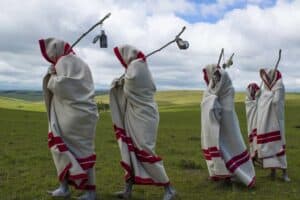South African 'first people' would include the San, Khoi Khoi and, some would argue the Xhosa, whose initiation schools are attracting negative attention.

Deaths, injuries and illness during traditional initiation rites are unforgivable.
“The usual causes of death are dehydration and septic infections,” writes Mondli Makhanya. “There have been instances in which beatings, mistreatment and food deprivation (all in the name of hardening the initiates for manhood) have contributed to deaths.”
This season, there are increasing allegations of kidnapping and abduction of boys, some as young as nine. Criminals are getting rich by abusing traditional practices.
The overall message is clear: don’t send your son to a rural setting to be circumcised, for cash, by someone who is not medically trained in any culture and who doesn’t bother with hygiene, never mind sterilisation. Indeed there is a cyclical cacophony of condemnation, rising in the summer and winter initiation seasons, then disappearing as other news makes the headlines.
ALSO READ: EC initiation schools to be monitored after 23 initiates die
More must be done to save lives. And the process should be set in motion now, while attention is focused. At the time of writing at least 23 youngsters had died this season in Eastern Cape initiation schools.
Some suggest banning the practice altogether. Yet that might be like throwing out the baby with the bathwater (to use a bad metaphor). What right has anyone to condemn the traditions of others, where such practices don’t necessarily cause harm, except when badly implemented by incompetents and charlatans?
I say this as a Transkei-born South African who is reading an account of the ill-treatment of Native Americans – “Indians” – by those who assumed their own influence was civilising. Bury My Heart at Wounded Knee: An Indian History of the American West, by Dee Brown is a detailed account of cruelty, violence and betrayal inflicted on Native Americans by settlers.
More than 100 years after the 1776 Declaration of Independence proclaimed, “all men are created equal”, the US Supreme Court ruled, “an American Indian is by birth an alien and a dependent”.
Imagine that – people who were there before the settlers were declared aliens by the settlers’ court. South Africa did the same. American Indian birth-right citizenship was not resolved until 1924. Our birthright citizenship issues took longer.
South African “first people” would include the San, Khoi Khoi and, some would argue the Xhosa, whose initiation schools are attracting negative attention.
ALSO READ: Decision to close initiation schools meets opposition
Do we really know enough about Xhosa traditions to say initiation and circumcision must be removed entirely from the bush, relocated to a sterilised and sterile environment? Wouldn’t something be missing?
Laurens van der Post popularised the idea of mystical “Bushmen” having a broader cosmic vision than ours.
American Carl Sandburg did something similar in his poem, Circles: The white man drew a small circle in the sand And told the red man “This is what the Indian Knows” and drawing a big circle around the Small one, “This is what the white man knows.” “The Indian took the stick and swept an immense Ring around both circles: “This is where the White man and the red man know nothing”.
When we understand there is so much we don’t know, it might be unwise to campaign against traditional practices if they are not harmful when performed correctly.
Support Local Journalism
Add The Citizen as a Preferred Source on Google and follow us on Google News to see more of our trusted reporting in Google News and Top Stories.






